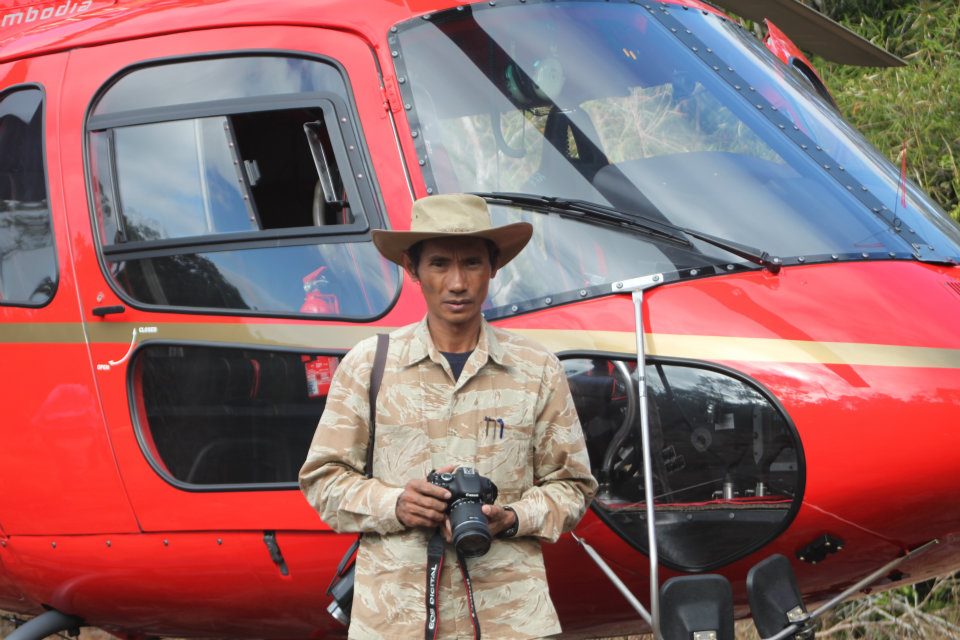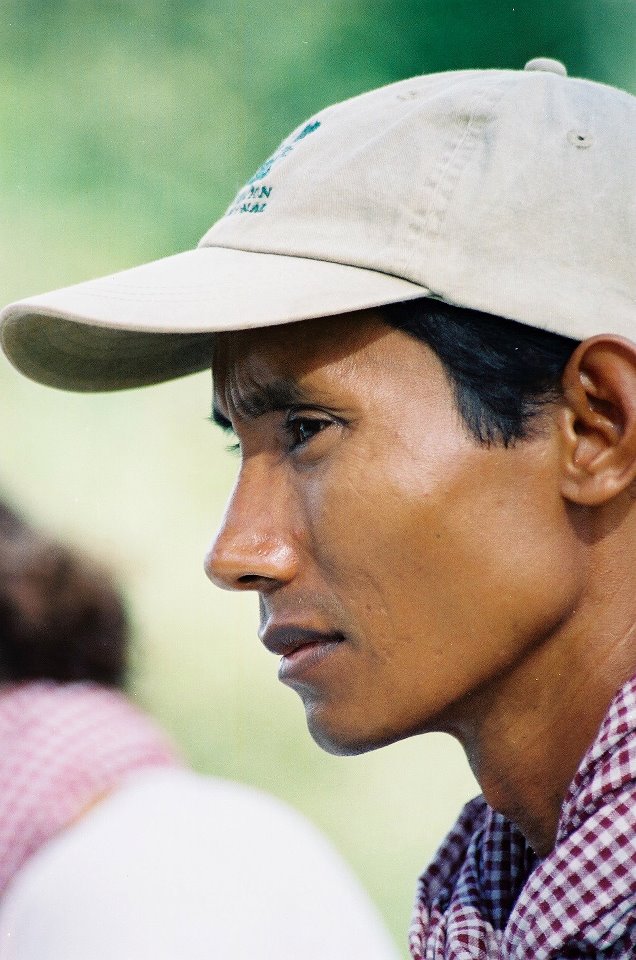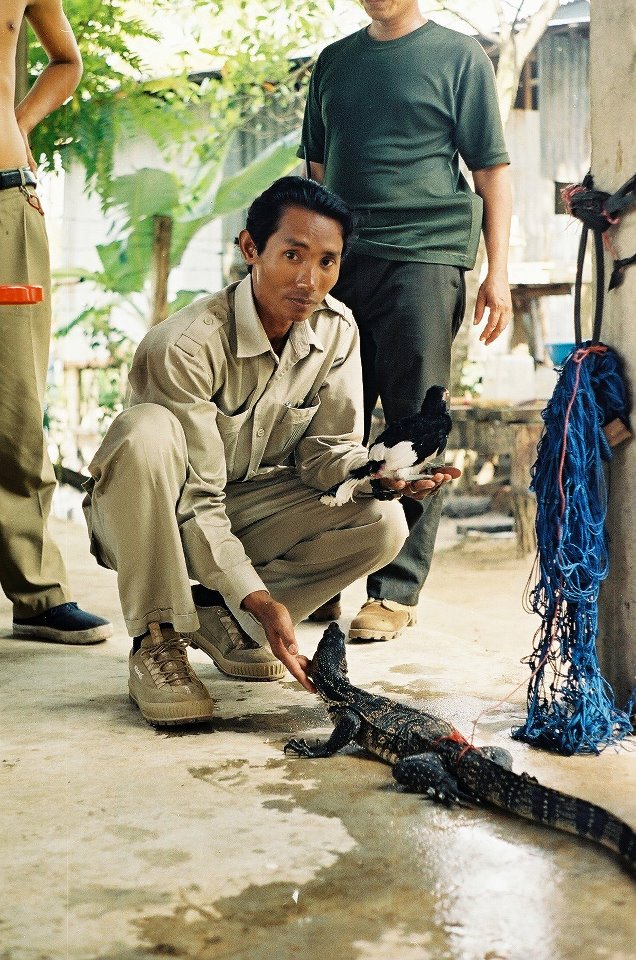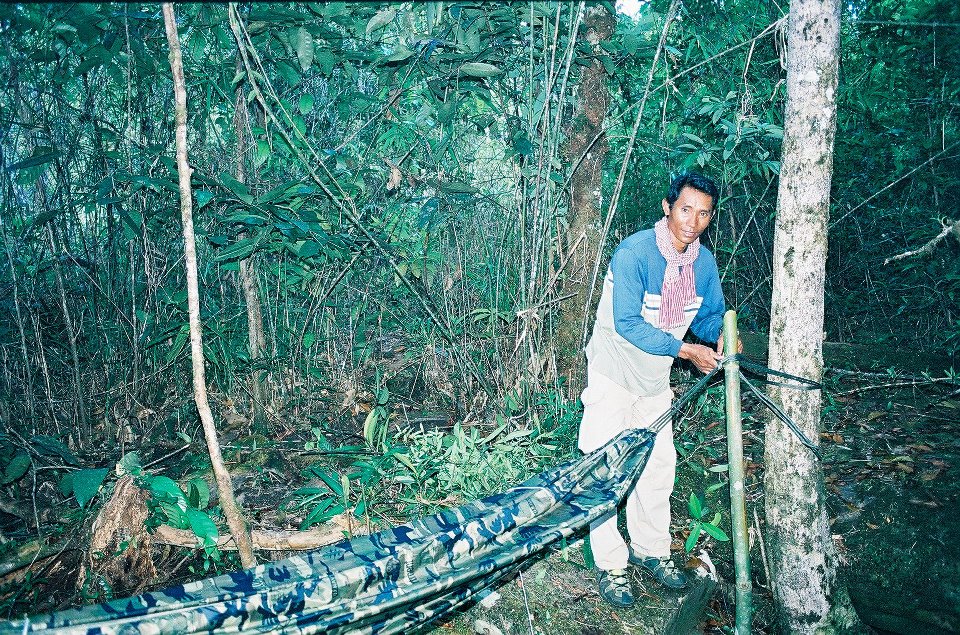It was a stiflingly hot Phnom Penh evening when I last saw Chut Wutty, one week before his murder. Sitting outside in the still heat, he seemed unaffected: alert as ever, engaged, yet humble and gentle. We discussed strategies for working with communities in the Cardamom Mountains and elsewhere, wondering how to help them to protect their land and forests from the onslaught of illegal logging and land grabbing that has swept across Cambodia.
But this was no ordinary conversation. Wutty did not have time for the platitudes of mainstream conservation, or its apolitical ‘partnerships’ with government agencies. No. His ideas were characterised by a radical determination to seek truth and justice, as seen through his work in Prey Long and his leadership of the Natural Resources Protection Group (NRPG).
Chut Wutty was a soldier for Nature and Humanity, who inspired millions of Cambodians, and others around the world. He was on the frontline of a dirty war, in which Cambodia’s forests are being liquidated for unthinkable profits that accrue to a powerful few, while indigenous and local communities are left as voiceless bystanders, dispossessed from the forests that have sustained them for centuries.
Photo: Peter Pigott, 2002
The murder of Chut Wutty is a senseless and brutal tragedy. Not just for the loss of an incredibly brave and inspirational man, but for the loss of what he represented for Cambodian people. Wutty dared to stand up to power. He dared to confront the dark forces of violence, corruption and greed that have come to characterise the Cambodian state and its criminal-corporate enterprise (Le Billon 2000; Hughes 2003; Global Witness 2007).
Cambodia has been termed a ‘country for sale’. According to the human rights group Licadho, 22% of Cambodia’s surface area is now controlled by private firms, mainly through Economic Land Concessions (ELCs) held by agro-industrial companies (see Vrieze and Naren 2012). The land being sold off for private gain is not unoccupied or disused. Furthermore, it is often forested, which means that concession holders can obtain windfall profits from timber sales before cash cropping even begins. The government’s issuing of land concessions without warning or consultation has come at the expense of ordinary Cambodians. Tens of thousands of farmers have been evicted or forcibly displaced by ELCs in recent years (Schneider 2011). However, until about five years ago, it was unthinkable that villagers would organise themselves to challenge directly the powerful interests that threaten their land and livelihoods, as we have seen in Prey Long in recent years.
The role of Chut Wutty in inspiring villagers to protest against unjust development and exploitation across Cambodia cannot be ignored. He emboldened people to assert their rights in the face of intimidation, and in spite of daily poverty and insecurity. Indeed, with the support of a handful of others, he ignited the flame of a social movement in Cambodia around land, forests, and resource rights. Only someone of extraordinary selflessness and courage could inspire people in this way, as seen last November, when villages formed a ‘human shield’ around Wutty to protect him from police attacks.
Photo: Peter Pigott, 2002
One of Chut Wutty’s most critical achievements, therefore, was that he broke the deadlock of fear and complicity that so often paralyses villagers, community leaders and NGOs in Cambodia, preventing them from taking action against illegal logging and other injustices. Many have argued that this paralysis is part of Cambodia’s national psyche, and that the country is forever doomed to suffer from a ‘lack of local agency’ and civil society (├Цjendal and Sedara 2006; Brinkley 2012). But Chut Wutty and his allies were beginning to prove otherwise.
Apart from mobilising community action, Wutty was also instrumental in exposing forest crime in remote areas such as the Cardamom Mountains, where he was shot and killed on Thursday. The scourge of illegal logging for luxury timber, predominantly rosewood (genus Dalbergia), has left no corner of Cambodia unturned. However what is remarkable about the ‘rosewood phenomenon’ in Cambodia is the use of state authority and resources to facilitate its extraction and trade. Apart from dubious government licences and military protection for loggers, even hospital ambulances have been diverted from public duty to transport rosewood.
Probing deeper into the context of the Cardamom Mountains, however, the rosewood story becomes more complicated. On the day that Chut Wutty died, he was travelling from Pursat to Koh Kong on a new road constructed by the China-Yunnan Corporation, as part of its development of the Atai Dam, located in the Central Cardamoms Protected Forest. This forest area is part of a multi-million dollar ‘conservation landscape’ that is funded by international donors and managed mainly by Conservation International and the Cambodian Forestry Administration.[1]
Since 2009, when construction of the Atai Dam began, the trafficking of rosewood in the northern Cardamom Mountains has been rampant. It appears that tens of millions of dollars of timber have been extracted from the area so far, under the auspices of the MDS Import Export Company. This well-connected Cambodian company was originally contracted only to clear forest from the Atai dam reservoir area, but its logging activities have been widespread and systematic. The same has occurred around other dam sites further to the south, as Chut Wutty helped to expose last year. Remarkably, Conservation International has remained silent on this issue, refusing even to acknowledge the existence of illegal logging in the area, in spite of cries for help from villagers, and evidence of their own park rangers’ complicity in the timber extraction.
It is this failure of mainstream and ‘official’ conservation efforts that pushed the battle for Cambodia’s forests to the fringe. This is what drove Chut Wutty and his colleagues at NRPG to risk their lives gathering data on illegal logging operations in the Cardamom Mountains and elsewhere. The work of NRPG revealed not only the culpability of government officials who abuse their powers to profit from logging, but also the hypocrisy of NGOs like Conservation International that have denied the existence of logging altogether, in order to maintain the fa├зade of effectiveness, along with their government and donor relationships.
Photo: Peter Pigott, 2002
This highlights the other key contribution of Chut Wutty’s work as a conservationist: he was real and uncompromising. He therefore offered us an alternative, more radical, vision for nature conservation. By operating ‘on the edge’, Wutty was able to destabilise power structures and demand accountability from government officials and NGOs in a way that nobody else dared. This made him a vital force for conservation in Cambodia and elsewhere, and as Marcus Hardtke points out, his actions actually made a difference.
It is unlikely that mainstream conservation organisations will ever fulfil the role that Chut Wutty played in Cambodia. His life-force and approach as a leader and eco-warrior was truly unique, and this must be honoured and sustained by the Cambodian people. However, Wutty’s story and his tragic death in the Cardamom Mountains should serve as a wake-up call for conservation organisations and donors working in partnership with the Cambodian government on natural resource management. It is now no longer enough for them simply to choose a politically correct path of ‘capacity building’ and ‘technical advice’ for government, without challenging the status quo in some way. Or, if they are unwilling to do this, then they should at least commit to nurturing local social movements and protecting those who are prepared to stand in the firing line, as Chut Wutty did.
As I write, the first stage of Wutty’s Buddhist funeral is taking place in his home village of Svay Meas, in Kandal province, near Phnom Penh. Not able to be there in person, I have asked two young Cambodian friends to go in my place. They are educated and motivated people, with a heartfelt desire to pursue justice and environmental conservation in Cambodia. The murder of Chut Wutty has hurt them, causing a wound of despair and outrage. But somehow, collectively, this pain must be converted into a force for change. The future of Cambodia depends upon it, as does the legacy of Chut Wutty.
In this struggle, we can derive hope from the words of Svay Phoeun, village representative in Preah Vihear who worked with Wutty: “Chut Wutty’s heart is gone, but thousands of Chut Wutty hearts still survive. We are not afraid of the person who killed Chut Wutty… we have never been afraid”.
Dr Sarah Milne is a Postdoctoral Fellow in the Resource Management Asia-Pacific Program at the Australian National University. She is interested in the practice and politics of transnational biodiversity conservation, especially in the Cambodian context. Her PhD research focused on community-based conservation in the Cardamom Mountains, where she worked with Chut Wutty and others from 2002-2005.
References
Brinkley, J. (2012) Cambodia’s curse: The modern history of a troubled land: PublicAffairs.
Global Witness (2007). ‘Cambodia’s family trees: Illegal logging and the stripping of public assets by Cambodia’s elite’. London, A report by Global Witness, June 2007.
Hughes, C. (2003) The political economy of Cambodia’s transition 1991-2001. London and New York: RoutledgeCurzon.
Le Billon, P. (2000) ‘The political ecology of transition in Cambodia 1989-1999: War, peace and forest exploitation’, Development and Change 31: 785-805.
├Цjendal, J. and K. Sedara (2006) ‘Korob, kaud, klach: In search of agency in rural Cambodia’, Journal of Southeast Asian Studies 37(3): 507-526.
Schneider, A. (2011) ‘What shall we do without our land? Land grabs and rural resistance in Cambodia’, Global Land Grabbing conference, Land Deal Politics Initiative, University of Sussex.
Vrieze, P. and K. Naren (2012) ‘SOLD: In the race to exploit Cambodia’s forests new maps reveal the rapid spread of plantations and mining across the country’, The Cambodia Daily March 10-11: p. 4-11.
 Facebook
Facebook  Twitter
Twitter  Soundcloud
Soundcloud  Youtube
Youtube  Rss
Rss 


